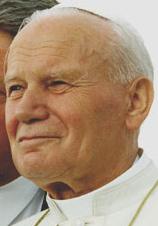John Paul, the Great Communicator
Remembering Pope John Paul II on this second anniversary of his final pilgrim journey, this one “home”, recalls the days when the whole world seemed to come to Rome to just be where he was, and he was all over the news. All John Paul, all the time. Which turned into all Catholic Church, all the time. And the coverage was remarkably good and deep and fascinating.
He reached people in a profoundly personal and fatherly way, loving and teaching and listening to them. From his youngest days, his earliest writings reveal an understanding of the power of the word that transcends something like literary analysis. As a young man, he created the “theater of the word” to highlight the ultimate centrality of expression over dramatic staging and acting. Everything else in a play was there to serve and feature the word, the expression.
One of the best things I’ve read on this is a fascinating book by Kenneth Schmitz “At the Center of the Human Drama”, and I’m grateful to papal biographer George Weigel for recommending it to me a few years ago. It’s a study in the writings of Karol Wojtyla, and particularly his understanding of human nature.
What is certain, at any rate, is that the young Wojtyla was fascinated by the word–spoken, written, and declaimed.
Schmitz quotes Wojtyla’s 1952 book “On the Theater of the Word” to explain his vision of activity being “subordinated to the inner discipline of the word and its meaning.”
It’s no wonder he was a great communicator. One of the last things John Paul wrote in his pontificate was “Rapid Development“, which I made the mission statement of my radio show because of what it declared about the importance of using words and their media transmission responsibly.
The rapid development of technology in the area of the media is surely one of the signs of progress in today’s society…
Many challenges face the new evangelization in a world rich with communicative potential like our own. Because of this, I wanted to underline in the Encyclical Redemptoris Missio that the first Areopagus of modern times is the world of communications, which is capable of unifying humanity and transforming it into – as it is commonly referred to – “a global villageâ€.
Yes. He traversed it more than any Successor of the Apostles. Which is why at the end of his life, one news article said that if the world is a global village, John Paul was known as the village priest. He knew how to connect with people, and use that interaction to elevate and ennoble them. Connecting with people carries that responsibility, he said.
The communications media have acquired such importance as to be the principal means of guidance and inspiration for many people in their personal, familial, and social behavior. We are dealing with a complex problem, because the culture itself, prescinding from its content, arises from the very existence of new ways to communicate with hitherto unknown techniques and vocabulary.
Ours is an age of global communication in which countless moments of human existence are either spent with, or at least confronted by, the different processes of the mass media…
The mass media can and must promote justice and solidarity according to an organic and correct vision of human development, by reporting events accurately and truthfully, analyzing situations and problems completely, and providing a forum for different opinions. An authentically ethical approach to using the powerful communication media must be situated within the context of a mature exercise of freedom and responsibility, founded upon the supreme criteria of truth and justice.
Some of us in the media are trying to follow that approach. The Daughters of St. Paul are among a good many who are doing it well, and they put together this tribute using their media resources as just one way to honor the memory and spread the word of a great communicator and Holy Father.

